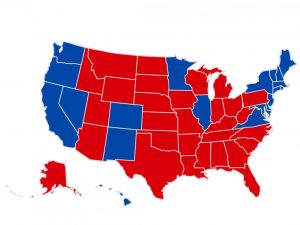Opinion: Electoral College Not Broken, Don’t Fix It
October 30, 2020
Despite the drawbacks people may bring up about the electoral college, it’s still important to the U.S. election.
The electoral college is necessary for electing a president. It allows even and thoughtful representation across all 50 states.
Individuals are represented through the electors picked by the political parties in each state. These electors can be state party leaders, state elected officials or political affiliation with their party’s presidential candidate.
There is a perception the electoral college and the electors completely ignore the majority votes of their electorate. Seven electors did this in the 2016 election. However, this practice, called faithless voting, has never affected the outcome of the an election.
In fact, the electors from 33 of the states are required to take a pledge to vote for whoever their state’s majority, and 16 of those states have laws in place to have their vote thrown out, fined or serve jail time if they don’t follow their promise. This was constitutionally upheld by the Supreme Court Chiafalo v. Washington on July 6.
Additionally, each state receives the same number of electoral votes as they have members of congress. In total, there are 538 electoral votes spread among the states. A candidate needs at least 270 electoral votes to win, according to USA.gov.
A common argument against the electoral college is the use of a winner-take-all system. The system dictates that whichever candidate the majority of the electors must vote for, automatically wins all the electoral votes of the state. This is active in 48 states, and it can lead to a large number of people not being represented. This is partially to blame for why some presidents lose the popular vote but win the election.
There have been five presidents who did not win the popular vote but won the electoral vote. This happened to Presidents John Quincy Adams, Rutherford B. Hayes, Benjamin Harrison, George W. Bush and Donald Trump.
Despite the flaws in the winner take all system, it’s still better than abolishing the electoral college. This is because this system is still better than placing the election in the hands of the politically naive. The founding fathers gave the public little credit for keeping up with political news and awareness when it came to the presidential election. Yes, the people today have more potential access to news and information, but do you want people who primarily get their news from social media outlets like TikTok and Instagram to have your fate in their hands?
Also, the whole reason behind the decision to go with the electoral college was to ensure people in less populous states, such as those in the modern day midwest, still had equal representation when compared to larger states like Texas and California. It prevents the most populated states from deciding the election alone.
Lastly, the difficulty with removing the electoral college would be the government would need to pass an amendment to change this system. The amendment would have to pass in two-thirds of the House of Representatives, two-thirds of the Senate and three-fourths of the states. The odds of that many states giving up a voice in the elections is unlikely.
There is simply no need for the removal of the electoral college. It is a very effective system to elect the president, and it should not change.



